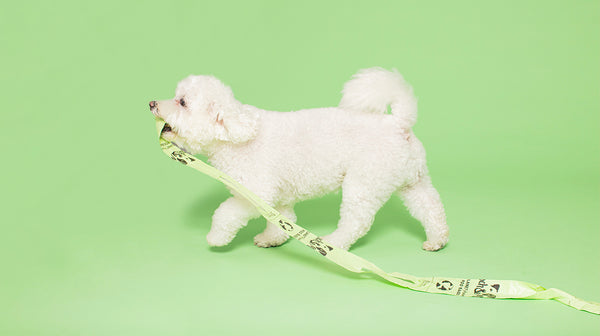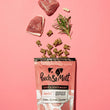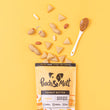FREE UK DELIVERY ON ORDERS OVER £39.99
Most dog parents will recognise this walkies scenario: you’ve a doggy bag in hand, prepped and ready for your pooch to poop - but nothing’s happening! Perhaps your pup keeps squatting to no avail, or it seems as if they’re in discomfort?
When your dog has symptoms of constipation, it can make you feel somewhat hopeless to help them, as well as anxious to solve this for your poor pooch as soon as possible.
Rest assured. There are lifestyle tweaks you can make to encourage your dog to let go, so that hopefully, they won’t have such a strained relationship with their poop in future. Read on for some potential reasons your pooch won’t poop, as well as at-home remedies to get their bowels in motion again.
In case you didn’t know, dog constipation is when no matter how hard they try, your dog can’t get out a poop. As we all know, pooping is a vital step in the process of digesting food and clearing out the bowels.
Not doing so can result in pain and discomfort in a dog’s tummy and colon area, as well as bloatedness and lethargy. At its worst, it can make your dog very unwell and even cause rectal prolapse.
Constipation hits dogs for mostly the same reasons humans get it - they usually aren’t getting enough fibre and other nutrients in their diet. If they’re getting a full and balanced diet, however, there are lots of other reasons for constipation in dogs that will need to be considered.
Here are some of the reasons your dog might be stuck without a poop:

It’s easy to spot when your dog has constipation; these are some tell-tale signs...
So how do we tackle constipation in your pained pooch? Let’s lay out all the available treatments for dog constipation, including both at-home remedies and vet-prescribed, so you’ll soon know how to make a constipated dog poop quickly.
As constipation is usually the result of a lack of fibre, your first port-of-call should be the food your dog eats. If you know that diet could be improved or tweaked to support your pooch’s bowels, it’s time to go granular with what your dog consumes and fill in the gaps in nutrition.
Boosting your pooch’s meals with powerful supplements can work wonders in beating constipation. Consider some dog supplements for constipation, such as:
These come as tablets or powder to add to a dog’s food, and may contain natural sources of soluble fibre such as Psyllium Husk or Flaxseed.
As pumpkin is such a nutritious natural fibre source, pumpkin powder supplements can give your dog’s gut and bowels a ‘push’.
Probiotics for dogs come in various forms. Though natural ways might come from live yoghurt or vegetables, you can get probiotic treats for dogs, or get them as a probiotic powder to add to your dog’s meals.
If you take your dog to the vet for their constipation issues, they might prescribe the following treatments…
When advised by a vet, laxatives can be a quick and smooth treatment for dogs - just don’t buy them over the counter without a vet’s recommendation.
work in a similar way to laxatives, and again, are useful for dogs with constipation only when prescribed by a vet. Definitely don’t use human stool softeners on your dog.
Your vet might advise more exercise for your dog, particularly if they live quite a sedentary lifestyle. Getting moving more often can work wonders on bowel regularity.

It’s not always necessary to take your pooch to a vet if they have constipation - you might like to try a few at-home remedies to get your dog pooping again.
Many dog owners try the Ice Cube Technique on a constipated dog - which is basically giving ice cubes to your dog to eat alongside food.
The idea is that your dog will consume more water than usual (eating ice will hopefully feel like a treat) and get an extra shot of hydration. If you think your dog will stick their nose up at ice cubes, serve your pooch some crushed up ice alongside their regular food.
Be sure to still provide a good amount of water in their regular water bowl - the more water they get, the better. Ample hydration should help ease their constipation and get their bowels moving.
Don’t try the following when your dog has trouble pooping…
It’s important not to ignore it when your dog won’t poop. Not only will your dog feel greater discomfort over time, untreated constipation can lead to a severe blockage in their colon which only exacerbates the problem.
Eventually, your pooch may experience a decreased appetite, a general sense of sickness and lethargy, and may even suffer long-term issues with pooping and straining (such as rectal prolapse). As soon as you notice your dog is having trouble ‘going to the bathroom’, start investigating ways to help them out.
If you’ve tried adding more fibre to your dog’s diet, massaging their lower body and getting your pooch to drink more water, and still you’re not seeing any improvement after a day or so, it’s time to get in touch with your vet. They can rule out any more serious causes for your dog’s pooping issues, and perhaps prescribe some medication or specialist food to tackle the problem.
If you suspect you have a constipated puppy, you should consult a vet before trying any supplements or home remedies, as puppy’s tums are very sensitive. You can try feeding them some fibre-rich food and get them to drink more water though.
Supplements can have undesired side effects in your pooch, such as loose stools, nausea or sickness. It’s important to gradually introduce them into your dog’s diet rather than give a sharp uptake in fibre. Chat to your vet for advice specific to your dog.
A lot of dogs refuse to poop just anywhere. This is because they’re territorial creatures, and choose a specific spot based on scent-marking and their surroundings. Where they choose might also be part of a regular routine for them. Basically, it’s important that they feel comfortable before they settle down to poop.
There are laxatives for dogs, but getting them over-the-counter isn’t a great idea. Laxatives can be powerful, and sometimes not the right medication for a specific dog’s issue, so must always be prescribed on the advice of a vet. If you want to try some alternative remedies, consider some fibre supplements for dogs, such as pumpkin powder. Never use laxatives for humans on dogs - their physical effects are different on the delicate canine body and could cause harm.
The best way to prevent constipation in your dog is with a fibre-rich, well-balanced diet packed with nutritious, whole ingredients. Nutrition is the fastest route to a healthy digestive system, a harmonious gut microbiome and reliable, regular poops! Also, be sure your dog gets plenty of water to stay well hydrated, and gets their body moving with daily exercise.
If you’re looking to give your dog’s digestive system a boost, get some powerful, gut-nourishing probiotics into their diet with our probiotic supplements for dogs, or delicious probiotic dog treats.





Never miss a treat!
Subscribe to our newsletter and get blog articles amongst other treats delivered to your inbox





Comments (0)
Leave a comment